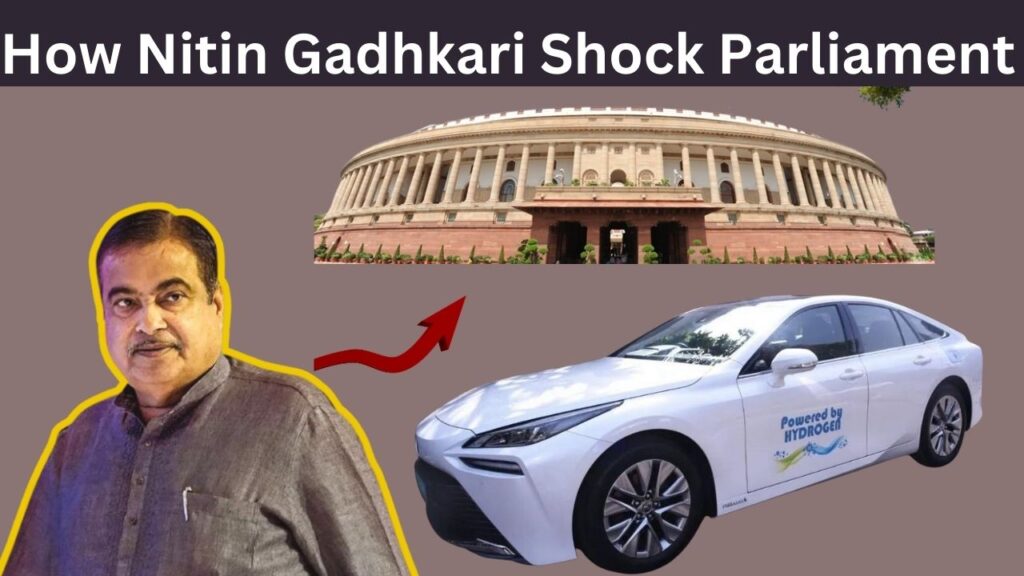

How Hydrogen Car In India Introduce
There’s no climate solution without clean hydrogen. And there’s no clean hydrogen without action.
A hydrogen vehicle that uses hydrogen fuels for motive power. As per 2021, there are two model of hydrogen cars publicly available; the Toyota Mirai(2014), and Hyundai Nexo (2018).The Honda clarity which was in production from 2016 to 2021 was not commercially available. For promoting Hydrogen car our respected Road transport minister Mr. Nitin Gadkari has recently bought a Hydrogen powered car i.e. Mirai which he uses as his daily commute car. The car is mainly powered by green hydrogen.

Mr Nitin Gadakari Become First Member Of Parliament To Use Hydrogen Car During His Visit To Parliament
About green hydrogen – Why Their is a Need of Hydrogen Car In India
When hydrogen and oxygen molecules are separated using renewable source of energy results in the formation of green hydrogen, which is then used in hydrogen fuel cells.
Benefits of using green hydrogen over grey hydrogen
Green hydrogen emits less carbon as compared to grey hydrogen.
The cost of green hydrogen lies in the range of Rs100-150 per kg.
It will bring down the driving cost.
Green hydrogen is also the solution for India’s fuel problem as said by Mr. Nitin Gadkari.
Principles behind hydrogen engines
When hydrogen reacts with oxygen, energy is formed in the form of electricity as this vehicle is also known as FCEV (Fuel Cell Electric Vehicle). These are being hailed as the future of sustainable transportation.
About the Hydrogen Cars– Hydrogen car India
Toyota Mirai FCEV

Price – ($63,000 Around 60 Lakhs INR)
Mirai was launched in Japan at the end of 2014 and began sales in California. Its starting price in India is 60 lakh rupees. It is based on a Lexus LS and now is rear wheel drive. The tank holds 5.6 kg of hydrogen and this gives the second-gen Mirai a range of around 640 km range on the WLTP cycle.
Hyundai Nexo

Price – ($68,000 Around 65 Lakhs INR)
The Hyundai Nexo launched as a SUV and available in India at a starting price of Rs 65 lakh. It is powered by a 120kw motor with fuel capacity of 163 litres .
Pros And Cons Of Hydrogen Car
Pros
1. Hydrogen fuel cell vehicle are smooth, quiet, and peaceful to drive.
2. They emit no poisonous gases just water vapour.1kilogram of hydrogen will be enough to drive 50-60 miles.
3. Their high efficiency and extended range compared to battery powered electric vehicles
4. Hydrogen vehicles have a range of over 300 miles on single tank of hydrogen.
Cons
- Hydrogen production process results in high carbon emission and high energy inputs are also required.
Is India ready for hydrogen cars?
With government and corporate support some corporate giants like Reliance Industries has lined up mega investment for the clean environment.
Toyota, the world’s largest carmaker, is likely to include India in its Hydrogen-powered car roll-out.
Collaboration like never before
It is no longer a choice in scenarios like building an ecosystem that’s why some triggering collaborations are being seen. Reliance has partnered with Bosch and FEV.
Toyota has joined hands with commercial vehicle major Ashok Leyland. Hydrogen car In India Dream Will Soon Achievable
Will hydrogen vehicle kill EVs?
Already strategies had been made to kill EVs, which is Fuel Cell Vehicles. Hydrogen fuel cell vehicles run on electrically generated from hydrogen stored in fuel tanks, emitting only vapor and air exhaust.
Challenges
1. One of the biggest challenges is the lack of infrastructure for distributing hydrogen fuel.
2. High cost of production.
Role of Govt.
The Union Government has approved amount of Rs 19,744 crore for National Green Hydrogen mission that aims to make India a ‘global hub’ for using, producing and exporting green hydrogen.
Dont Forget To Read These Blogs Too
Conclusion
- Hydrogen fuel cell technology is still in its nascent stage, and infrastructure for refueling is only available in parts of America and Europe.
- They offer many advantages over traditional gasoline-powered vehicles and battery-powered electric vehicles.
- Significant challenges are need to be addressed.
Some facts
- Hydrogen is the most abundant element on Earth.
- Hydrogen vehicles are being able to travel 300-400 miles a tank and can be refueled in 3-5 minutes.
- New global hydrogen car market study indicates hydrogen powered vehicles are expected to take off by 2028 .
FAQs
- How environmentally friendly are hydrogen vehicles?
A car with zero emission would be ideal from an ecological point of view.
- How does a Hydrogen car work?
Hydrogen cars are powered by an electric motor and classified as e-cars. Hydrogen reacts with oxygen in the process which is known as reverse electrolysis.
